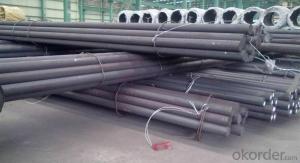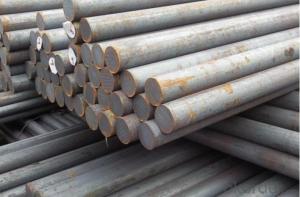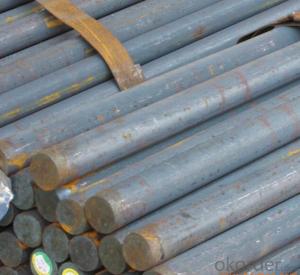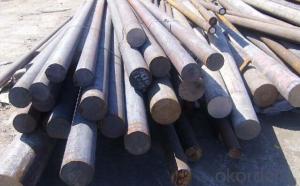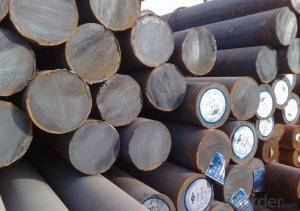Grade AISI1045 Din1.1191 JIS s45c GB45 Hot Rolled Carbon Steel Round Bar
- Loading Port:
- Shanghai
- Payment Terms:
- TT or LC
- Min Order Qty:
- 3 m.t.
- Supply Capability:
- 10000 m.t./month
OKorder Service Pledge
OKorder Financial Service
You Might Also Like
Item specifice
Grade AISI1045_Din1.1191_JIS s45c_GB45 Hot Rolled Carbon Steel Round Bar
Details of AISI1045_Din1.1191_JIS s45c_GB45 Hot Rolled Carbon Steel Round Bar
Name | SAE1045 Carbon Steel Round Bar |
Shape | Round Bar/Square Bar/Flat Bar/Plate/Wire |
Standard | GB/ASTM/SAE/AISI/DIN/JIS/EN/BS |
Surface Treatment: | Black/Peeling/Polished/Machined |
Delivery Condition: | Hot Rolled or Forged/Peeled or Black Surface |
Test | SGS/UT 100% Elements Testing |
Certificate: | ISO/Mill Certificate |
Service: | 24 hours online service / |
more than 20 years trading and manufacture | |
Quality Assurance: | the third party inspection, such as SGS, BV, TUV…etc. is acceptable |
Packaging Details: | Seaworthy Packaging or as per customer's packing instruction |
Specification of AISI1045_Din1.1191_JIS s45c_GB45 Hot Rolled Carbon Steel Round Bar
Grades Comparison
GB | ASTM | JIS | DIN | BS | NF |
45# | 1045 | S45C | C45 | IC45 08047 | C45 |
Chemical Composition
C | Si | Mn | Cr | P/S | Cr |
0.42-0.50 | 0.17-0.37 | 0.5-0.8 | ≤0.25 | ≤0.35 | 0.3-0.5 |
Sizes information
Sizes detalis | diameter | 16-320mm |
length | 3-12m(canbe customerized) | |
Sizes tolerance (max) | length | +/-100mm |
diameter | +/-2mm | |
Straightness | 3mm/m |
CNBM Introduction of AISI1045_Din1.1191_JIS s45c_GB45 Hot Rolled Carbon Steel Round Bar Supplier
CNBM International Corporation is the most import and export platform of CNBM group(China National Building Material Group Corporation) ,which is a state-owned enterprise, ranked in 270th of Fortune Global 500 in 2015.
With its advantages, CNBM International are mainly concentrate on Cement, Glass, Iron and Steel, Ceramics industries and devotes herself for supplying high quality series of refractories as well as technical consultancies and logistics solution.
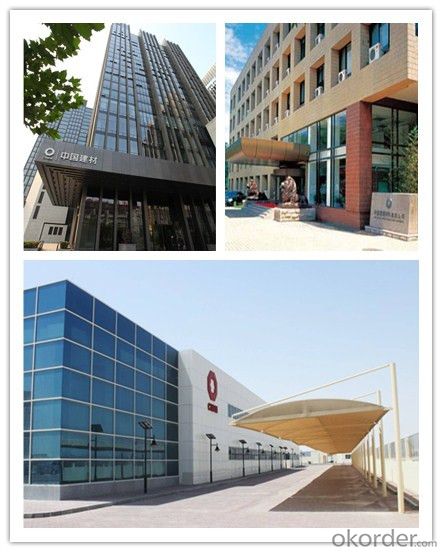
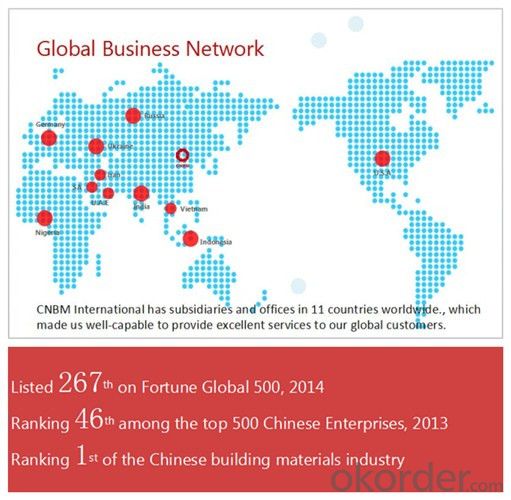
After-sale service |
|
Advantages
|
|
Packaging & Delivery AISI1045_Din1.1191_JIS s45c_GB45 Hot Rolled Carbon Steel Round Bar
Packaging Detail | Sea worthy packing /as per customer's packing instruction |
Delivery Detail | 15 ~ 40 days after receiving the deposit |
Products Show
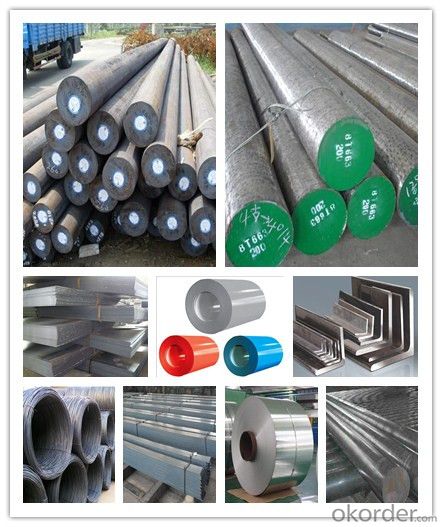
FAQ:
Are you a trading company or manufacturer? | Manufacturer |
What’s the MOQ? | 3 metric ton |
What’s your delivery time? | 15-35 days after downpayment received |
Do you Accept OEM service? | Yes |
what’s your delivery terms? | FOB/CFR/CIF |
What's the Payment Terms? | 30% as deposit,70% before shipment by T/T |
Western Union acceptable for small amount. | |
L/C acceptable for large amount. | |
Scrow ,Paybal,Alipay are also ok | |
Why choose us? | Chose happens because of quality, then price, We can give you both. Additionally, we can also offer professional products inquiry, products knowledge train (for agents), smooth goods delivery, excellent customer solution proposals. |
What's your available port of Shipment? | Main Port, China |
What’s your featured services? | Our service formula: good quality+ good price+ good service=customer's trust
|
Where are your Market? | Covering more than 160 countries in the world |
- Q:What are the safety measures taken during the production of special steel?
- To ensure the safety and wellbeing of workers and reduce potential hazards, various safety measures are taken during the production of special steel. These measures encompass the following: 1. Personal Protective Equipment (PPE): All workers involved in special steel production must wear appropriate PPE, including safety helmets, goggles, gloves, and protective clothing. This safeguards them from injuries, burns, and exposure to hazardous substances. 2. Training and Education: Workers undergo comprehensive training and education on safe work practices and procedures. They gain knowledge about the potential hazards associated with special steel production and receive training on the proper handling of equipment and materials. 3. Risk Assessments: Regular risk assessments are conducted to identify potential hazards and evaluate the level of risk associated with each task. This facilitates the implementation of control measures to mitigate risks and prevent accidents. 4. Machinery and Equipment Safety: All machinery and equipment used in the production process are meticulously maintained and regularly inspected to ensure optimal working conditions. Safety features, such as emergency stop buttons and guards, are installed to prevent accidents and injuries. 5. Ventilation and Exhaust Systems: Given the high temperatures and use of chemicals in special steel production, ventilation and exhaust systems are installed to eliminate harmful fumes and gases from the work environment. This ensures a safe and healthy atmosphere for workers. 6. Fire Prevention: To minimize the risk of fire accidents, fire prevention measures are implemented, including the installation of fire alarms, extinguishers, and sprinkler systems. Workers are also trained on fire safety protocols and evacuation procedures. 7. Emergency Response Plans: Comprehensive emergency response plans are developed and communicated to all workers. These plans outline the steps to be taken in the event of accidents, fires, or other emergencies, ensuring a swift and organized response. 8. Regular Safety Inspections: Safety professionals conduct regular inspections to identify any potential safety hazards or non-compliance with safety protocols. Any issues or deficiencies are promptly addressed to maintain a safe working environment. By implementing these safety measures, special steel production can be carried out in a controlled and safe manner, safeguarding workers and minimizing the risk of accidents or injuries.
- Q:What is the chemical composition of special steel?
- Special steel encompasses a wide range of steel alloys that possess specific properties and characteristics. The chemical makeup of special steel can differ depending on the particular grade or type of steel being discussed. Nevertheless, special steel typically contains greater amounts of alloying elements compared to regular carbon steel. These alloying elements may consist of chromium, nickel, molybdenum, vanadium, tungsten, and others. The specific combination and proportion of these alloying elements determine the distinctive properties of special steel, such as increased strength, enhanced resistance to corrosion, improved ability to withstand high temperatures, or better resistance to wear and tear. To illustrate, some common variations of special steel include stainless steel, which generally consists of high levels of chromium and nickel, resulting in excellent corrosion resistance; tool steel, which contains high carbon content and often includes additional elements like vanadium or tungsten, making it suitable for cutting, drilling, or shaping tools; and high-speed steel, which incorporates elements such as molybdenum, cobalt, or tungsten, providing exceptional hardness and heat resistance, ideal for use in cutting tools or drills. To summarize, the chemical composition of special steel varies based on the specific type or grade, but it typically involves elevated levels of alloying elements to achieve desired properties such as strength, corrosion resistance, heat resistance, or wear resistance.
- Q:What is the impact strength of special steel?
- The impact strength of special steel can vary depending on its composition and specific grade. However, special steel is generally known for its high impact strength, making it highly resistant to sudden shocks, impacts, and fractures.
- Q:Can special steel be used in the production of consumer goods?
- Yes, special steel can be used in the production of consumer goods. Special steel offers enhanced properties such as high strength, durability, corrosion resistance, and heat resistance, making it suitable for various consumer goods applications. It can be utilized in the manufacturing of kitchen utensils, cutlery, appliances, automotive parts, tools, and more, ensuring improved performance and longevity of these products.
- Q:Can special steel be used in the electronics manufacturing industry?
- Yes, special steel can be used in the electronics manufacturing industry. Special steel, such as stainless steel or alloy steel, can be used for various applications in electronics manufacturing, including the production of components, casings, connectors, and other parts. The unique properties of special steel, such as corrosion resistance, high strength, and thermal conductivity, make it suitable for use in the electronics industry, where precision, durability, and reliability are crucial.
- Q:What are the specific requirements for special steel used in the marine industry?
- Special steel used in the marine industry must meet specific requirements to ensure its suitability for the harsh marine environment. These requirements include high strength, corrosion resistance, and toughness. Firstly, high strength is crucial for special steel used in the marine industry as it needs to withstand the extreme loads and stresses experienced at sea. This strength allows the steel to resist deformation and maintain structural integrity under heavy loads, such as the weight of the ship itself or the forces generated by waves and wind. Corrosion resistance is another vital requirement for marine-grade steel. The presence of saltwater, which is highly corrosive, poses a significant challenge. Special steel for the marine industry should have excellent resistance to corrosion, preventing the formation of rust and other forms of degradation. This resistance ensures the longevity of the steel structures and reduces maintenance and repair costs. Toughness is also essential in marine-grade steel. It must be able to withstand impact and shock loads, as ships and offshore structures are constantly exposed to rough seas and potential collisions. The steel should possess the ability to absorb and distribute energy without fracturing or failing, ensuring the safety and reliability of the marine structures. In addition to these requirements, special steel used in the marine industry must also meet specific standards and certifications, such as those set by classification societies like the American Bureau of Shipping (ABS), Lloyd's Register (LR), or Det Norske Veritas Germanischer Lloyd (DNV GL). These organizations set standards for materials, construction, and inspection processes to ensure the reliability and safety of marine structures. Overall, the specific requirements for special steel used in the marine industry include high strength, corrosion resistance, toughness, and compliance with industry standards and certifications. Meeting these requirements ensures the steel's ability to withstand the unique challenges posed by the marine environment and helps ensure the safety and longevity of marine structures.
- Q:What are the different types of precipitation-hardening steel?
- There are several types of precipitation-hardening steel, including 17-4 PH, 15-5 PH, 13-8 PH, and 17-7 PH. These steels are known for their high strength and corrosion resistance, making them suitable for various applications in industries such as aerospace, automotive, and medical.
- Q:How does special steel perform in magnetic applications?
- Special steel, also known as stainless steel, generally performs well in magnetic applications. However, it is important to note that not all types of stainless steel are magnetic. The magnetic properties of special steel depend on its composition and the presence of certain elements such as nickel, manganese, and chromium. Austenitic stainless steel, which is the most common type, is non-magnetic due to its high nickel content. This makes it ideal for applications where magnetic interference is undesirable, such as in sensitive electronic devices or medical equipment. On the other hand, ferritic and martensitic stainless steels, which have lower nickel content, are magnetic. These types of special steel are commonly used in applications where magnetic properties are required, such as in magnetic separators, transformers, and electric motors. It is worth mentioning that the magnetic strength of stainless steel is relatively weak compared to other magnetic materials like iron or nickel. Therefore, if a strong magnetic field is needed, alternative materials may be more suitable. Overall, special steel can perform well in magnetic applications depending on the specific type and composition. It is important to consider the desired magnetic properties and consult with experts or refer to material specifications to ensure the appropriate selection for a particular application.
- Q:How does special steel contribute to the manufacturing aftermarket industry?
- The manufacturing aftermarket industry greatly relies on special steel to enhance the performance, durability, and reliability of components and equipment. Special steel is particularly valuable because it can withstand extreme conditions like high temperatures, corrosive environments, and heavy loads. This makes it an ideal choice for producing critical parts in industries such as automotive, aerospace, energy, and machinery. In the manufacturing aftermarket industry, special steel is commonly used to create replacement parts for machinery or equipment that have deteriorated or been damaged over time. By using special steel, these replacement parts can meet the specifications set by the original equipment manufacturer (OEM) in terms of strength and resilience. Moreover, special steel enables the development of innovative designs and the production of lightweight and efficient components. This leads to improved equipment performance, reduced energy consumption, and increased productivity. For instance, in the automotive industry, special steel is used to make lightweight engine components, resulting in better fuel efficiency and lower emissions. Furthermore, the use of special steel in the manufacturing aftermarket industry helps to reduce maintenance and downtime costs. By using high-quality steel, the longevity of replacement parts is increased, reducing the need for frequent repairs or replacements. Consequently, this decreases production downtime and associated expenses while enhancing overall equipment reliability. Additionally, special steel offers a wide range of customization possibilities, allowing manufacturers to tailor the material properties to meet specific requirements. This flexibility enables the development of unique solutions and the production of specialized components that meet the demands of different industries. It also enables manufacturers to address specific challenges related to wear resistance, hardness, or toughness, which are crucial factors in the aftermarket industry. In conclusion, special steel plays a crucial role in the manufacturing aftermarket industry by enhancing the performance, durability, and reliability of replacement parts. Its ability to withstand extreme conditions, enable innovative designs, reduce maintenance costs, and offer customization options make it an indispensable material in the production of components and equipment across various industries.
- Q:What are the different types of tool and die steel?
- There are several different types of tool and die steel, including high-speed steel (HSS), carbon tool steel, alloy tool steel, and powdered metal steel. Each type has specific properties and characteristics that make it suitable for different applications in tool and die making.
1. Manufacturer Overview |
|
|---|---|
| Location | |
| Year Established | |
| Annual Output Value | |
| Main Markets | |
| Company Certifications | |
2. Manufacturer Certificates |
|
|---|---|
| a) Certification Name | |
| Range | |
| Reference | |
| Validity Period | |
3. Manufacturer Capability |
|
|---|---|
| a)Trade Capacity | |
| Nearest Port | |
| Export Percentage | |
| No.of Employees in Trade Department | |
| Language Spoken: | |
| b)Factory Information | |
| Factory Size: | |
| No. of Production Lines | |
| Contract Manufacturing | |
| Product Price Range | |
Send your message to us
Grade AISI1045 Din1.1191 JIS s45c GB45 Hot Rolled Carbon Steel Round Bar
- Loading Port:
- Shanghai
- Payment Terms:
- TT or LC
- Min Order Qty:
- 3 m.t.
- Supply Capability:
- 10000 m.t./month
OKorder Service Pledge
OKorder Financial Service
Similar products
New products
Hot products
Related keywords
